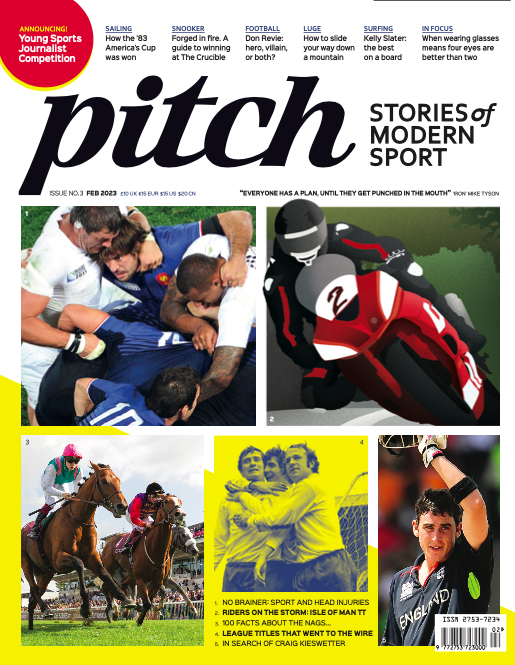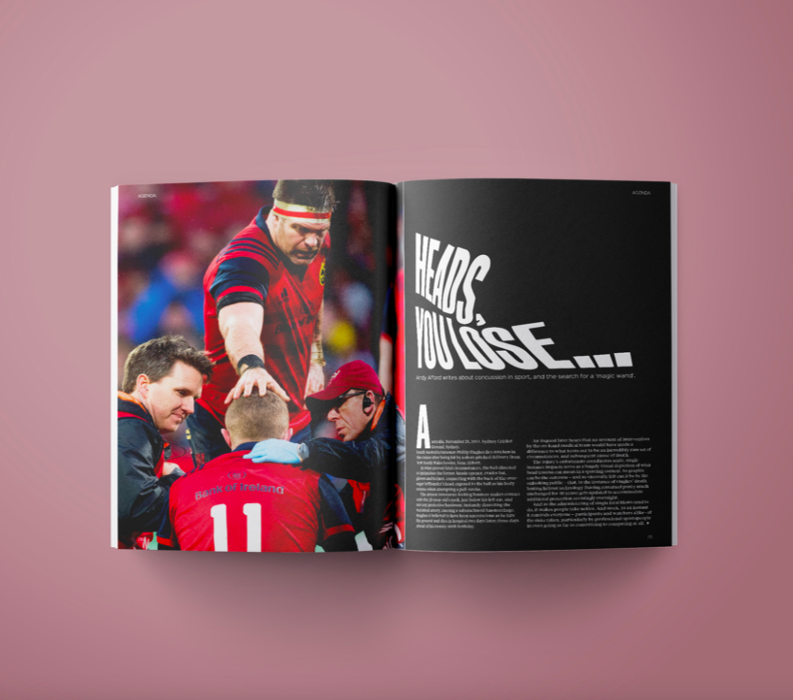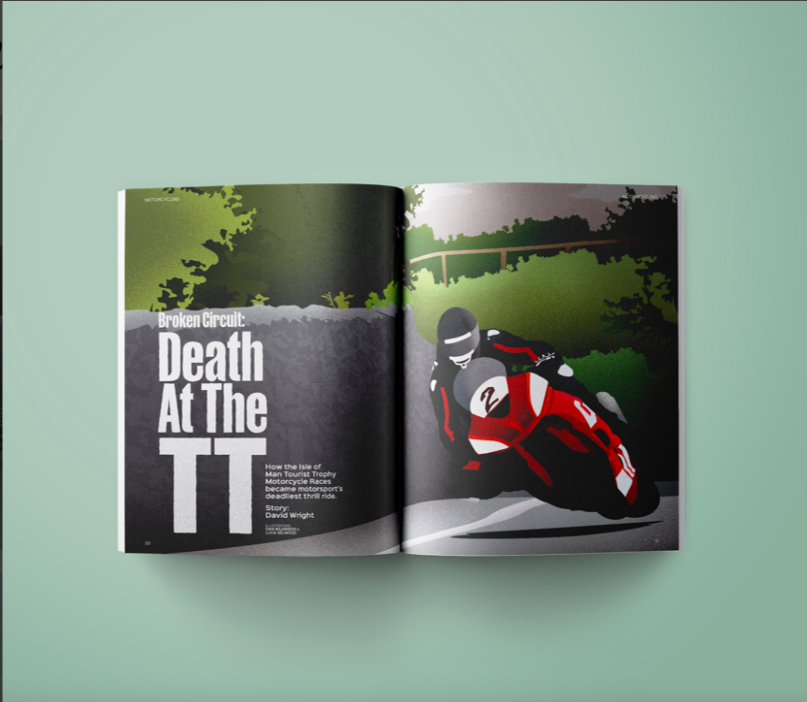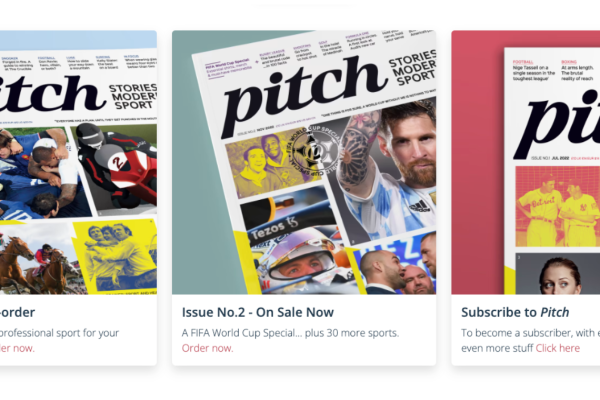Game changer – Publisher Kevin Whitchurch talks about launching his new sports magazine, Pitch
Publisher Kevin Whitchurch had the idea for his latest sports magazine while watching cricket on a glorious English summer’s day. “I was with my friends and our conversations ranged across all sports – football, rugby, Wimbledon, the Olympics. We were free-ranging without pausing to think this may not be of interest,” he recalls. “It was a general love of sport and of what’s going on and it got me thinking about a new multi-sport magazine.”
The result of that day at the cricket is Pitch, a beautiful, glossy quarterly that delves deeply into the talking points behind sports. Whether it’s the concussion debate in rugby union, the rise of women’s sports or the human rights controversy that surrounded the Football World Cup in Qatar, issues are covered in long-form articles that sit alongside interviews with stars and fun sections like a Pub Guide to lesser-known sports. It’s a magazine that invites you to kick off your shoes, find a comfortable chair and enjoy the tactile experience of holding a quality print product.

“There are a million online media streams you can get your information from, but there aren’t very many places where you can take your time to read the whole story,” says Whitchurch. “We like to deep-dive and run long stories and expect people to sit down and read. I would put us in the same category and Delayed Gratification or Monocle in that you can’t just flick through it. It’s filled with carefully chosen words.”
A good opening partnership
Having dreamt up Pitch, it would take about four years for Whitchurch to get the magazine published. After approaching creative agency Stencil to do the design and editorial for the publication, plans were shelved during the height of the Covid outbreak, and the project was only resurrected in spring last year.

“It’s an interesting and relatively modern way to put a magazine together,” says Whitchurch, who in 1994 launched revered football magazine FourFourTwo. “If I were to have strengths, I would say it’s in publishing and Stencil has the creative impetus and infrastructure. So, the partnership works really happily. It’s not that I employ them to do the magazine – we do it together.”
In Stencil’s creative director Andy Afford, Whitchurch has the perfect collaborator to work on Pitch. A former professional cricketer, Afford could share his own experiences when the magazine looked into the scourge of concussion in a recent issue.
In addition to a love for sport, both Afford and Whitchurch have a real passion for print, with Afford noting on the Stencil website: “When print is done well, it becomes a great ambassador for the brand.”
“I absolute agree with that sentiment – I’m print through and through,” says Whitchurch. “Like everybody else, you embrace any new media, but I still find myself gazing lovingly at magazines on the newsstand.
“Print has become something you can savour. When you come up with a magazine idea and plan you are building that into your model now – we’re £10 (US$12), we’re quarterly. So, it’s slow consumption and that fits the model of most people in magazines these days. A magazine looks, smells and feel individual and things on a screen just doesn’t. There’s nothing quite like picking up a nice heavy magazine.”

Getting the youth onside
Whitchurch’s love for sports writing goes back to his childhood. Growing up near Manchester he fell in love with Manchester United and envied those whose job it was to cover the team.
“In the 1960s, I thought Manchester United was the most glamorous thing I’d ever seen and there was a Manchester Evening News correspondent, David Meek, whose only job was to write about Man United,” he recalls. “I thought, when I was seven or eight, that this was the best thing ever. Not only is there this glamourous team but there’s a job where you get to write about them.”
After becoming enamoured with sports journalism at an early age, Whitchurch is now committed to inspiring young people to take up writing. Pitch has launched a Young Sports Journalist competition (sponsored by FIPP and The Times), tasking four age groups to write 700-800 words on a different sports topic.
Ages 14-17 will do a feature on whether sports players get paid too much; ages 17-19 on whether winning is the most important thing; ages 19-21 on whether e-sports should be included in the Olympics; and ages 21-24 on whether transgender sports players should be allowed to compete in the Olympics. The top pieces will be published in Pitch and on the magazine’s website and the winner of each category will get £150 ($181.5) in prize money. The competition runs until 7 April and the winners will be announced in May.

“I think it’s amazingly important to engage young people and get them interested in sports writing,” says Whitchurch. “Given that the competition is linked to a magazine there is something permanent about what they are doing. Their stuff will be published in a magazine, so it’s there forever. I like the idea that a 15-year-old girl can hold a magazine in her hand and say: ‘That is my piece, I wrote that.’ I hope the competition leads to a swathe of new female sports reporters.”
Ask Whitchurch what advice he would give to aspiring publishers and he says backing yourself is key. “It’s about having the courage of your convictions. If you think it’s a good idea, just stick with it. There is always room for good content. And there’s enough support if you have an idea. You can find a way.”
And while the coverage of sport is changing at a rapid rate thanks to technology, Whitchurch believes there will also be a demand for glossy magazines that take you into the thick of the action.
“I know broadcasters are looking at smart screens where they can attach stats and info,” he says. “But I know there will still be stories to be told through magazines. There will always be fascinating games and, unlike so much in life, we don’t know what’s going to happen in them. And for me that’s the glory of what we do – not knowing how things will turn out.”








